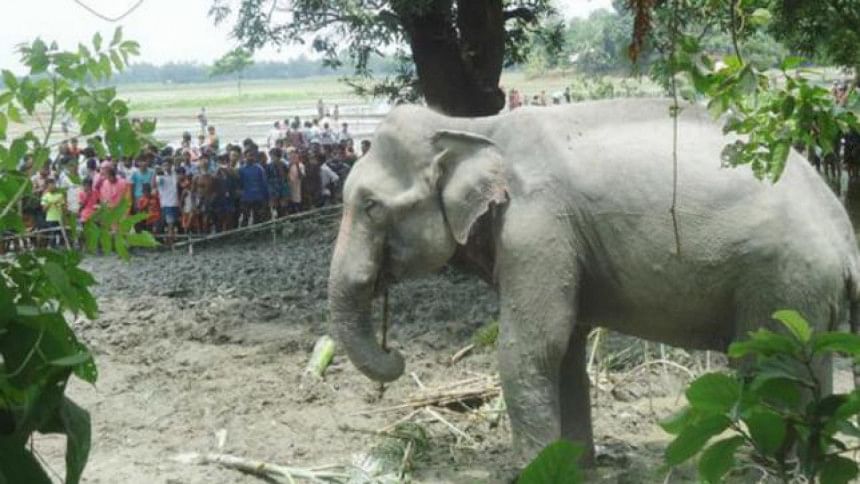An elephant eloquent, instructive in his death

If while living, the wild animal had animated us, in death it has enlightened us. We saw and felt its nearly six-week long odyssey through the elements of nature before he died—all live and palpable. The educative effect of experiencing the saga first hand has been more pronounced on our minds than perhaps watching a dozen episodes on the Discovery and National Geographic channel, among others.
We gave it a name in its dying moments-Banga Bahadur - almost with a posthumous ring to it. But we gave it alright with love and empathy for an animal in dire distress, its occasional rampaging fury regardless, primarily owing to its circumstances. In part, it may also have been a conscience-salving gesture for not being able to do as much for its rescue as we should have.
Let's, however, highlight a wildlife interest in the fact that the animal must have had a herd identity, a surname, so to speak. It could not have been anonymous among elephants who live in herds. What's particularly relevant is, they have 'deep family bonds and live in tight matriarchal groups led by the oldest and often largest female in the herd.'
One can thus feel in one's bones the pain and trauma the wild elephant, separated from its herd by severe flooding in Assam, must have gone through all the way down to Bangladesh. Totally disconnected from its habitat and without a mother figure, sibling or a friendly companion to look up to, Banga Bahadur was thrown completely off- gear, disoriented and dazed. Sucked on to the roller-coaster journey of well over a 1000km (Western media puts it at 1700km), the animal cascaded, turned, rolled over and violently pushed around the contours, landing on shallow waters, chars or marshy pockets. We know that wild elephants can swim but that it could for such a long distance was a revelation!
Two astounding features of elephant behaviour are their high intelligence and memory levels. Banga Bahadur must have used some of these in howsoever a miniscule degree to navigate to safety. It is the memory that serves the herd chief during dry seasons to guide the flock to watering holes tens of miles away that it had seen a long time ago.
They also display, wildlife experts have found, signs of grief, joy, anger and playfulness.
It must have been terribly unsettling for the elephant that despite having an ability to communicate among its peers, it was so rudely left incommunicado to begin with. For all we know, the animal can communicate over long distances by producing 'a subsonic rumble that can travel over the ground faster than sound through air. Often elephants receive the messages through the sensitive skins on their feet and trunks.'
Sadly, none of these could have worked for Banga Bahadur!
It is interesting to note, however, that Banga Bahadur at one stage returned to the spot he had once unshackled himself from to jump into a pond, apparently of its own volition. So left to himself, given his superbly brainy navigation of the Brahmaputra and managing to get by some 45 days, he could have survived the ordeal with the human assistance around. The priority was not to be hung up on tranquilisers, but to let his body mechanism take over with nutrient doses administered for his recovery. The per day food intake of 300—400 lbs, that he on the whole missed for six weeks, was too much of a drag on his strength to be able to keep standing for any effective length of time.
The security concern could not have been insurmountable. On the contrary, a 30-feet trunk-to-tail long animal, weighing around four tonnes and that too gone weak and tired (the smallest truck is 5 tonnes) looked highly manageable.
Rather than point finger at each other, we should concentrate on staying prepared with specialised, auto-reflexive equipment and manpower base to respond on a short notice to a similar challenge in future.
We must pay heed to the following, "Preservation of wildness enhances both our capacity and our worthiness as a species and a civilisation, to survive on the earth."
Asian elephants are listed by IUCN 'as endangered' while their African cousins are categorised 'as near threatened.' With the Asian elephants reduced to 35,000—40,000, we would not have been one short of that dismal number if we had saved Banga Bahadur.

 For all latest news, follow The Daily Star's Google News channel.
For all latest news, follow The Daily Star's Google News channel. 




Comments